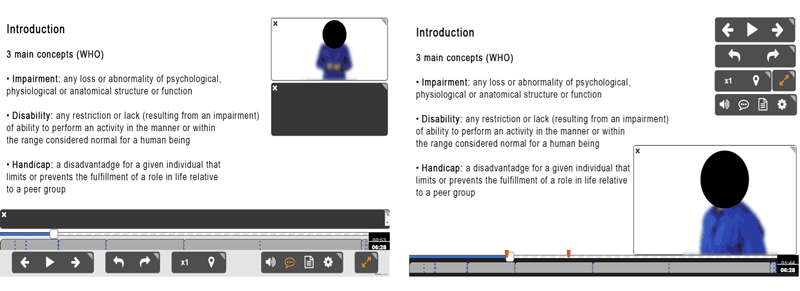by Hélène Sauzéon, Pascal Guitton and Pierre-Antoine Cinquin (Inria)
For an equal access to education and more particularly since the COVID crisis, there is a huge need for accessible Massive Open Online Course (MOOC) players for people with cognitive impairment. Aïana is a new accessible MOOC player, which has been co-designed by the stakeholders (learners with cognitive impairment, teachers, accessibility designers, etc) and assessed with a field study without an equivalent in the literature, including learners with and without disabilities. Early interactions (with accessibility features), participation, learning and learner experience supported our contribution to designing a more inclusive e-learning environment.
Aïana is a web media player [L1] meant to consume massive open online course (MOOC) resources [L2]. It started as a research project at Inria Bordeaux in the POTIOC team [L3] in collaboration with the FLOWERS team and the Inria Learning Lab (from 2016 to 2021). Its aim is to propose new design principles for MOOCs in order to let people with disabilities (PWD) (cognitive and non-cognitive impairments) have a better experience when consuming the contents.
In order to contribute to the fight against the digital divide in access to education and then to employment, our objective was to design and to assess a digital online teaching system accessible to People With Disabilities (PWD), particularly of cognitive origin, by adopting a truly inclusive approach:
No "PWD-specific" response but instead open to all
No focus on a specific pathology, but rather on cognitive function disorders (attention, memory, emotions, etc.)
Strong involvement of people with disabilities upstream for the design and downstream to validate the design choices.
Participatory design of Aïana
As there was no complete state-of-the art model of digital systems for inclusive education, we started by carrying out a systematic study [1] that validated the absence of a suitable response both in terms of research and software solutions.
We then decided to develop a MOOC player (Aïana) and in order to develop a really efficient and used tool, stakeholders (PWD students, experts) were involved from the beginning of the conception via individual interviews (collection of obstacles and needs, paper mock-up of GUIs). This allowed us to define several principles [2] (Figure 1):
- Separation of information flows (video, slides, comments) in order to facilitate their interpretation and to allow the use of adapted tools;
- Complete individualisation of the interface configuration (choice of displayed streams, location and size of their displays) in order to provide an environment adapted to the wishes and capacities of a user;
- Possibility to display an additional information in the form of short texts and icons to explain abbreviations or teacher’s feelings in order to externalise implicit elements of teaching;
- Content Structuring into chapters to reinforce acquisition through semantic navigation;
- Addition of markers (like Post-It notes in a handout) to sequences to optimise information processing (live and recorded);
- Choice between different views of the speaker to avoid face-to-face interaction or to promote joint attention.

Figure 1: Two configurations of AÏANA.
In order to validate our concepts, we built the MOOC, "Digital Accessibility", using the Aïana reader, and broadcasted on the FUN platform (French national MOOC platform), which counted more than 13,000 registrants of 60 nationalities. In order to be able to evaluate the choices made in real conditions, we asked the participants for their opinion via questionnaires (usability, satisfaction, free comments, suggestions) and measured their use of the tool by monitoring the functions used. These surveys were carried out in a totally anonymous way and were validated by the COERLE (Inria's ethics committee).
Results
The very large number of participants (n= 546) allowed for a large-scale preliminary study whose main results demonstrate the benefits of using Aïana:
- Almost 16.3% of students who have fully completed the MOOC, are PWD, one third more than the average reported in other MOOC platforms
- The average module completion rate was 90.4% for PWDs and 90.5% for typical students, and an equivalent attrition rate (dropouts) is observed for PWD and non-disabled persons
- All learners obtained very good results (average 89%), although the acquisition time was a little longer for PWD
- Learners reported a good level of satisfaction (average 75%, USE questionnaire standard), and above all consider that Aïana gives them a high level of feeling of competence and autonomy.
Conclusion
The outcomes of the field study support the positive impact of our design decisions and provide positive feedback about the benefits of Aïana for PWDs to engage in a MOOC, in particular with regard to people with cognitive impairments that are often insufficiently addressed. More research efforts and legal obligations are needed to narrow the digital divide between ordinary and extra-ordinary learners.
Links:
[L1] https://en.wikipedia.org/wiki/Massive_open_online_course
[L2] https://github.com/INRIA/aiana-player
[L3] https://team.inria.fr/potioc/research-topics/aiana/
References:
[1] P. A. Cinquin, P. Guitton, H. Sauzéon: “Online e-learning and cognitive disabilities: A systematic review. Computers & Education, 130, 152-167, 2019.
[2] P. A. Cinquin, P. Guitton, H. Sauzéon: “Designing accessible MOOCs to expand educational opportunities for persons with cognitive impairments”, Behaviour & Information Technology, 40(11), 1101-1119, 2021.
[3] P. A. Cinquin, P. Guitton, H. Sauzéon: “Toward truly accessible MOOCs for persons with cognitive impairments: a field study”, Human–Computer Interaction, 1-22, 2021.
Please contact:
Hélène Sauzéon, Inria Center of the University of Bordeaux, France










